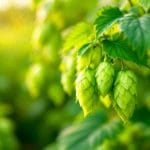Takeaways
- Hops can cause drowsiness and sedation
- They may interact with hormones, especially estrogen
- Some people experience digestive issues from hops
- Allergic reactions to hops are possible but uncommon
- Hops can interact with certain medications
- Dosage impacts the likelihood of side effects
What Are Hops?
Hops are the cone-shaped, green flowers of the Humulus lupulus plant.[1] Brewers commonly use them to give beer its bitter taste and distinct flavor.[2] However, hops also have a history of use in traditional medicine.
Hops contain several compounds that affect the body, including alpha acids, beta acids, and essential oils.[3] Each of these has different properties, which contribute to the various effects associated with hops.
People use hops for different purposes, such as to help with sleep problems or reduce anxiety.[4] They are also sometimes used to ease symptoms of menopause.[5] Knowing what hops are can help in understanding their possible side effects.
Common Side Effects of Hops
Drowsiness and Sedation
Hops can cause drowsiness, which is one of their most known effects.[6] The compounds within hops interact with the brain’s sleep-wake cycle.[7] This interaction can promote feelings of relaxation and sleepiness.
The drowsy effect of hops can be either helpful or harmful. It may aid sleep, but it could also be problematic during the day. Drowsiness from hops might impair safe driving or work performance.
Several factors can influence how much sleepiness hops cause:
- Your individual sensitivity
- The amount you consume
- The form of hops (tea, supplement, beer)
- Time of day you take it
- Other substances you’ve consumed
Hormonal Changes
Hops interact with the hormone estrogen in the body because they contain phytoestrogens.[8] These plant-based compounds act similarly to estrogen.[9] This can lead to shifts in the body’s hormone balance.
For some, these hormonal changes can be beneficial, such as reducing menopausal hot flashes.[10] However, for others, they can result in unwanted side effects, including menstrual cycle changes or mood swings.[11]
Here’s a comparison of hops to other plants that also have estrogen-like activity:
| Plant | Relative Estrogenic Activity |
|---|---|
| Hops | High |
| Soy | Moderate |
| Flax | Low |
| Red Clover | Moderate |
Digestive Issues
Some people experience digestive issues after consuming hops. These issues may include:
- Bloating
- Gas
- Stomach discomfort
- Nausea
This occurs because hops contain compounds that can irritate the digestive system. Some individuals are naturally more susceptible to these irritants than others.
If you have a history of digestive problems, you may be more likely to experience these side effects. The amount of hops consumed and how it’s consumed also play a role.
Less Common Side Effects
Allergic Reactions
Though uncommon, some people are allergic to hops. Allergic reactions can range in severity from mild to severe. Symptoms to watch for include:
- Skin rashes or hives
- Itching
- Swelling, especially of the face, tongue, or throat
- Difficulty breathing
If you develop these symptoms after consuming hops, seek medical help immediately, as severe allergic reactions can be life-threatening.
Interactions with Medications
Hops can interact with some medications, which is important to consider if you take any prescriptions.[12] Some interactions may increase side effects, while others may reduce the effectiveness of the medication.
Here are some medications that may interact with hops:
| Medication Type | Potential Interaction |
|---|---|
| Sedatives | Increased drowsiness |
| Estrogen-based drugs | Altered hormone levels |
| Blood thinners | Increased bleeding risk |
| Antidepressants | Possible serotonin syndrome |
Always inform your doctor about all supplements you’re taking, including hops.
Who Should Avoid Hops?
Certain groups of people should use hops with caution because their risk of side effects might be greater. Here’s who should avoid or limit hops:
- Pregnant women
- Breastfeeding mothers
- People with hormone-sensitive conditions
- Those with depression
- Individuals scheduled for surgery
Pregnant women should avoid hops due to their potential impact on hormones.[13] There is not enough information about how hops might affect a developing fetus. For breastfeeding mothers, hops could potentially affect milk production or quality.
People with hormone-sensitive conditions, like breast cancer or endometriosis, should exercise caution.[14] Hops’ estrogenic effects might worsen these conditions. Individuals with depression should consult a doctor before using hops, as their sedative effects could interact with depression symptoms or medications.
If you have scheduled surgery, stop using hops at least two weeks before the procedure.[15] Hops may increase the effects of anesthesia, which could be dangerous during surgery.
Hops in Different Forms
Supplements
Hops supplements are available in different forms, such as capsules, tablets, or liquid extracts.[16] These products often contain concentrated amounts of hops compounds. This concentration may lead to stronger effects and side effects.
Supplements might cause more intense reactions than consuming whole hops, due to the higher and more consistent dosage.[17] This makes it easier to ingest large amounts of active compounds.
When choosing a supplement, look for products from reliable manufacturers. Check the label for dosage information and warnings. Start with a low dose to see how your body reacts.
Beer and Other Alcoholic Beverages
Beer is the most common way people consume hops.[18] However, it can be hard to determine the specific side effects of hops in beer, since alcohol has its own effects that can mask or amplify those of hops.
The drowsiness from hops could add to alcohol’s sedative effects.[19] This combination may lead to a greater feeling of intoxication than usual. The hormonal effects of hops may also interact with alcohol’s impact on hormones.
The amount of hops in beer varies significantly. Craft beers and IPAs often contain more hops than light lagers.[20] This means that the possibility of side effects can differ among beer types.
Topical Applications
Some people use hops in creams, oils, or other skin products.[21] These topical applications can have different side effects than ingested hops. Skin reactions are the primary concern with these products.[22]
Potential skin reactions include:
- Redness
- Itching
- Rashes
- Irritation
If you have sensitive skin, test a small area first. Stop using the product if you notice any negative reactions. Topical hops products might also cause effects throughout the body if absorbed through the skin. But, these effects are usually less intense than with oral consumption.
Dosage and Side Effect Risk
The amount of hops you consume impacts your risk of side effects.[23] Higher doses typically mean a greater chance of experiencing unwanted effects. However, finding the right dose can be difficult.
There isn’t a standard recommended dosage for hops.[24] It varies based on the form you use and why you’re using it. For supplements, follow the instructions on the label. Begin with the lowest suggested dose.
Factors that influence your response to hops include:
- Your body weight
- Your overall health
- Other medications or supplements you’re taking
- Your individual sensitivity to hops compounds
Pay attention to how you feel after taking hops. If you notice any side effects, reduce your dose or stop using hops.[25] Speak with a healthcare provider for personalized advice on dosing.
Benefits vs. Side Effects
It is important to consider the possible benefits of hops against potential side effects. Hops might offer benefits for sleep, anxiety, or menopausal symptoms. However, these benefits come with the risk of side effects.
Consider your personal health. If you’re healthy and not taking other medications, the risk of side effects might be lower. But if you have existing health issues or take other drugs, the risks could outweigh the benefits.
Think about why you want to use hops. Are there alternative ways to achieve the same goal with less risk? Sometimes, lifestyle changes or other treatments may be safer options.
How to Minimize Side Effects
If you decide to use hops, there are ways to reduce your risk of side effects. Here are some strategies:
- Start with a low dose
- Increase the dose slowly over time
- Take hops earlier in the evening if using for sleep
- Avoid combining hops with alcohol or sedatives
- Choose high-quality products from reputable sources
Pay attention to how your body responds. Everyone reacts to hops differently. What works for someone else might not work for you.
If you experience unwanted effects, here’s what to do:
- Stop using hops immediately
- Note your symptoms and when they started
- Contact your healthcare provider if symptoms are severe
- Consider trying a lower dose once symptoms resolve
- If symptoms return, discontinue use of hops
When to Consult a Healthcare Provider
Talking to a doctor about using hops is always a good idea. But, in some situations, it’s especially important. Consult a healthcare provider if:
- You’re pregnant or breastfeeding
- You have a chronic health condition
- You’re taking prescription medications
- You’re planning to have surgery
- You experience severe side effects
Be honest with your healthcare providers about your hops use. This includes telling them about any supplements or beer consumption. This information helps them provide better care and avoid potential drug interactions.
Watch for these warning signs that require immediate medical attention:
- Severe allergic reactions (difficulty breathing, swelling)
- Unusual bleeding or bruising
- Severe stomach pain
- Rapid heartbeat or chest pain
- Signs of liver problems (yellowing skin or eyes, dark urine)
Alternatives to Hops
If you’re concerned about hops side effects, you might consider alternatives. Many other herbs and supplements offer similar benefits. Here’s a comparison of some options:
| Alternative | Uses | Potential Side Effects |
|---|---|---|
| Valerian | Sleep, anxiety | Headaches, stomach upset |
| Chamomile | Relaxation, digestion | Allergic reactions (rare) |
| Lemon Balm | Stress relief, sleep | Nausea, dizziness |
| Passionflower | Anxiety, sleep | Drowsiness, confusion |
Each alternative has its own benefits and risks. Research any new supplement before trying it. Consult with a healthcare provider, especially if you have any health conditions or take medications.
Myths and Misconceptions
There are many misconceptions about hops and their effects. Let’s clarify some common misunderstandings:
Myth: Hops in beer don’t have any health effects.[26]
Fact: Hops in beer can still have biological effects, though they’re often masked by alcohol.
Myth: Natural supplements like hops are always safe.[27]
Fact: Natural doesn’t mean risk-free. Hops can cause side effects and interact with medications.
Myth: More hops means better sleep.[28]
Fact: While hops can aid sleep, higher doses increase the risk of side effects without necessarily improving benefits.
Myth: Hops have no effect on hormones.[29]
Fact: Hops contain phytoestrogens that can interact with the body’s hormone systems.
Myth: You can’t develop tolerance to hops.[30]
Fact: Regular use of hops, especially for sleep, might lead to decreased effectiveness over time.
Understanding these facts helps you make informed decisions about using hops.
FAQs
Q: Can hops cause weight gain?[31]
A: There’s no direct evidence that hops cause weight gain. However, beer, which contains hops, can contribute to weight gain due to its calorie content.
How long do the effects of hops last?
Q: Can hops interact with birth control?[33] A: Hops might interact with hormonal birth control due to their phytoestrogen content. Consult your doctor if you’re concerned.
Q: Do hops have any effect on blood pressure?[34] A: Some studies suggest hops might have a mild effect on blood pressure, but more research is needed.
Are there any long-term side effects of using hops?
Conclusion
Hops offer potential benefits but also come with possible side effects. Common concerns include drowsiness, hormonal changes, and digestive issues.[35] Less frequent but serious side effects include allergic reactions and drug interactions.
Understanding these effects helps you make informed choices about hops use. Start with low doses, be aware of potential risks, and listen to your body. Consult healthcare providers, especially if you have existing health conditions or take medications.
Remember that what works for one person might not work for another. Your experience with hops can depend on many factors. Stay informed, be cautious, and prioritize your health and safety when considering hops use.
This is a basic botanical fact about hops. The Humulus lupulus plant is the source of the hops used in brewing and herbal remedies.
Source: “An Updated Review of the Genus Humulus: A Valuable Source of Bioactive Compounds for Health and Disease Prevention” https://www.ncbi.nlm.nih.gov/pmc/articles/PMC9782902/
Hops contain alpha acids that are isomerized during the brewing process to create bitterness. They also contribute flavor and aroma due to their essential oils.
These compounds are responsible for the bittering, flavoring, and aroma effects of hops, as well as some of its purported medicinal properties.
Hops have been used in traditional medicine for their sedative and calming effects, and some modern research is exploring these applications.
Source: “Exploring the Effect of Lactium™ and Zizyphus Complex on Sleep Quality: A Double-Blind, Randomized Placebo-Controlled Trial” https://www.ncbi.nlm.nih.gov/pmc/articles/PMC5331585/
Hops contain phytoestrogens, which may help with some symptoms of menopause, although more research is needed.
Source: “Protocol for systematic review and meta-analysis: hop (Humulus lupulus L.) for menopausal vasomotor symptoms” https://pubmed.ncbi.nlm.nih.gov/27105715/
Hops contain compounds that can interact with the brain’s sleep-wake cycle, leading to feelings of relaxation and sleepiness.
Source: “Exploring the Effect of Lactium™ and Zizyphus Complex on Sleep Quality: A Double-Blind, Randomized Placebo-Controlled Trial” https://www.ncbi.nlm.nih.gov/pmc/articles/PMC5331585/
The exact mechanisms are still under investigation, but some compounds in hops are thought to have sedative effects through interaction with neurotransmitter systems.
Source: “Exploring the Effect of Lactium™ and Zizyphus Complex on Sleep Quality: A Double-Blind, Randomized Placebo-Controlled Trial” https://www.ncbi.nlm.nih.gov/pmc/articles/PMC5331585/
Phytoestrogens in hops can bind to estrogen receptors and may have some estrogen-like effects.
Source: “Flavonoids as Phytoestrogenic Components of Hops and Beer” https://www.ncbi.nlm.nih.gov/pmc/articles/PMC7570471/
While they are not identical to human estrogen, they can interact with the body’s estrogen receptors. The effects can vary.
Source: “Flavonoids as Phytoestrogenic Components of Hops and Beer” https://www.ncbi.nlm.nih.gov/pmc/articles/PMC7570471/
While not a universally effective treatment, some individuals may experience a reduction in hot flashes with hops.
Source: “Protocol for systematic review and meta-analysis: hop (Humulus lupulus L.) for menopausal vasomotor symptoms” https://pubmed.ncbi.nlm.nih.gov/27105715/
The estrogenic activity of hops can disrupt hormonal balance, potentially leading to these effects.
Due to their sedative and hormonal effects, hops can potentially interact with prescription drugs. It’s important to discuss hops use with a doctor.
The phytoestrogens in hops could potentially affect hormone levels during pregnancy and could be detrimental, so avoiding hops is generally recommended.
Because of the phytoestrogenic activity of hops, they may exacerbate conditions sensitive to estrogen, and they should be used cautiously with medical supervision.
Hops may increase the effects of anesthesia, leading to dangerous complications.
Hops supplements are available as capsules, tablets, liquid extracts and more, and they usually contain concentrated forms of hops.
Supplements often contain concentrated amounts of active compounds from hops, which can lead to stronger effects and side effects compared to consuming hops in food or drink.
Since hops are used in the brewing process, beer is a common method to ingest them.
Both alcohol and hops can have sedative effects, which when combined, may result in a larger effect than either one would alone.
IPAs and other heavily hopped beers contain higher amounts of hops for flavor and aroma compared to light lagers.
Hops can be found as an ingredient in some skin creams and oils.
Source: “Xanthohumol-supplemented beer modulates angiogenesis and inflammation in a skin wound healing model. Involvement of local adipocytes” https://pubmed.ncbi.nlm.nih.gov/21898537/
Topical application of hops can cause skin irritation or allergic reactions for some people.
The risk and severity of side effects increases with the dose of hops.
Due to the wide variation in hops products and uses, there is no established or standardized dose for hops.
Reducing the dose or discontinuing use of hops is generally recommended if unwanted side effects are experienced.
Hops in beer can have biological effects, though these are often masked by alcohol, and can be dose dependent.
Hops, despite being a natural substance, can have side effects and interact with other medications, making it not always safe to consume.
While hops can aid sleep, higher doses do not mean better sleep, and often come with a higher risk of side effects.
Hops contain phytoestrogens which can interact with the body’s hormonal systems.
Source: “Flavonoids as Phytoestrogenic Components of Hops and Beer” https://www.ncbi.nlm.nih.gov/pmc/articles/PMC7570471/
Regular use of hops may lead to decreased effectiveness over time as the body can develop tolerance to its effects.
While hops themselves are unlikely to directly cause weight gain, other forms of consumption such as beer can cause weight gain due to their caloric content.
Due to the potential effects on hormones and limited research on pregnancy, hops are generally not recommended during pregnancy.
Hops’ phytoestrogenic activity may interact with hormonal birth control, though more research is needed.
Some studies suggest a mild effect of hops on blood pressure, but more research is needed.
These side effects are the most commonly reported concerns of hops consumption.



